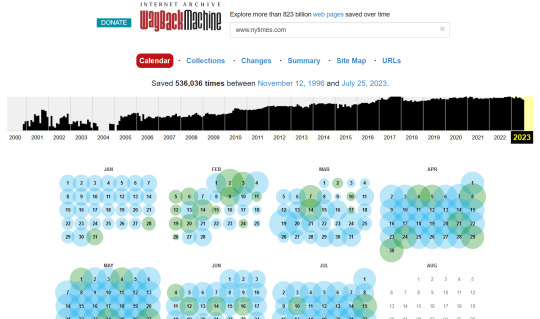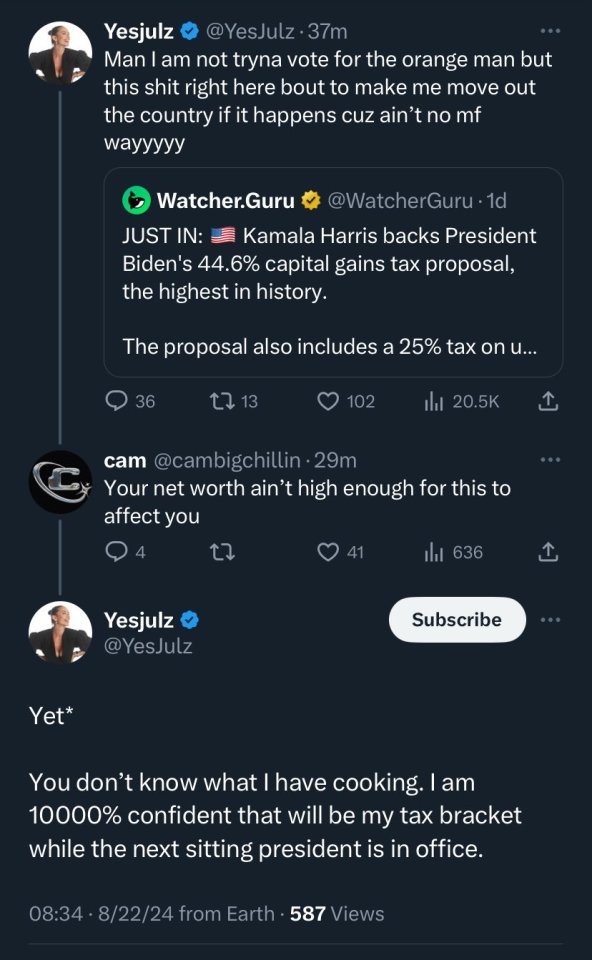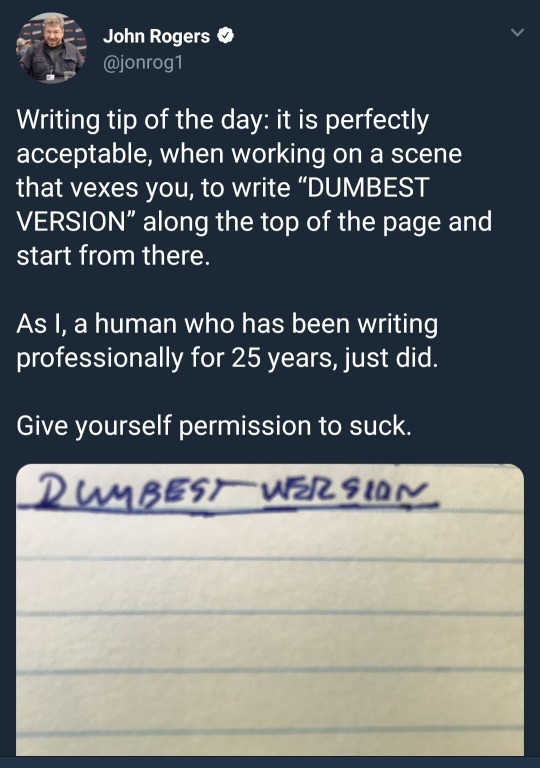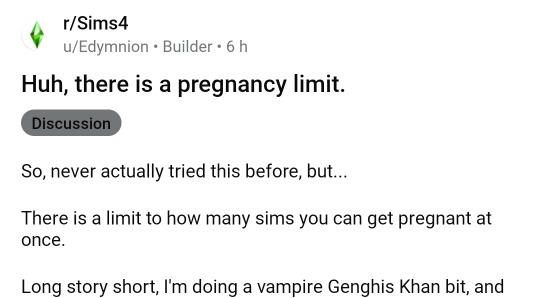Text
Not every story is about seeing yourself in it. Sometimes it’s about learning to see other people too.
188K notes
·
View notes
Text
thinking about anastasia trusova paintings again
86K notes
·
View notes
Text
Anybody else got that Evergiven sized writers block
202K notes
·
View notes
Text
17K notes
·
View notes
Text
How to make your writing sound less stiff
Just a few suggestions. You shouldn’t have to compromise your writing style and voice with any of these, and some situations and scenes might demand some stiff or jerky writing to better convey emotion and immersion. I am not the first to come up with these, just circulating them again.
1. Vary sentence structure.
This is an example paragraph. You might see this generated from AI. I can’t help but read this in a robotic voice. It’s very flat and undynamic. No matter what the words are, it will be boring. It’s boring because you don’t think in stiff sentences. Comedians don’t tell jokes in stiff sentences. We don’t tell campfire stories in stiff sentences. These often lack flow between points, too.
So funnily enough, I had to sit through 87k words of a “romance” written just like this. It was stiff, janky, and very unpoetic. Which is fine, the author didn’t tell me it was erotica. It just felt like an old lady narrator, like Old Rose from Titanic telling the audience decades after the fact instead of living it right in the moment. It was in first person pov, too, which just made it worse. To be able to write something so explicit and yet so un-titillating was a talent. Like, beginner fanfic smut writers at least do it with enthusiasm.
2. Vary dialogue tag placement
You got three options, pre-, mid-, and post-tags.
Leader said, “this is a pre-dialogue tag.”
“This,” Lancer said, “is a mid-dialogue tag.”
“This is a post-dialogue tag,” Heart said.
Pre and Post have about the same effect but mid-tags do a lot of heavy lifting.
They help break up long paragraphs of dialogue that are jank to look at
They give you pauses for ~dramatic effect~
They prompt you to provide some other action, introspection, or scene descriptor with the tag. *don't forget that if you're continuing the sentence as if the tag wasn't there, not to capitalize the first word after the tag. Capitalize if the tag breaks up two complete sentences, not if it interrupts a single sentence.
It also looks better along the lefthand margin when you don’t start every paragraph with either the same character name, the same pronouns, or the same “ as it reads more natural and organic.
3. When the scene demands, get dynamic
General rule of thumb is that action scenes demand quick exchanges, short paragraphs, and very lean descriptors. Action scenes are where you put your juicy verbs to use and cut as many adverbs as you can. But regardless of if you’re in first person, second person, or third person limited, you can let the mood of the narrator bleed out into their narration.
Like, in horror, you can use a lot of onomatopoeia.
Drip Drip Drip
Or let the narration become jerky and unfocused and less strict in punctuation and maybe even a couple run-on sentences as your character struggles to think or catch their breath and is getting very overwhelmed.
You can toss out some grammar rules, too and get more poetic.
Warm breath tickles the back of her neck. It rattles, a quiet, soggy, rasp. She shivers. If she doesn’t look, it’s not there. If she doesn’t look, it’s not there. Sweat beads at her temple. Her heart thunders in her chest. Ba-bump-ba-bump-ba-bump-ba- It moves on, leaving a void of cold behind. She uncurls her fists, fingers achy and palms stinging from her nails. It’s gone.
4. Remember to balance dialogue, monologue, introspection, action, and descriptors.
The amount of times I have been faced with giant blocks of dialogue with zero tags, zero emotions, just speech on a page like they’re notecards to be read on a stage is higher than I expected. Don’t forget that though you may know exactly how your dialogue sounds in your head, your readers don’t. They need dialogue tags to pick up on things like tone, specifically for sarcasm and sincerity, whether a character is joking or hurt or happy.
If you’ve written a block of text (usually exposition or backstory stuff) that’s longer than 50 words, figure out a way to trim it. No matter what, break it up into multiple sections and fill in those breaks with important narrative that reflects the narrator’s feelings on what they’re saying and whoever they’re speaking to’s reaction to the words being said. Otherwise it’s meaningless.
—
Hope this helps anyone struggling! Now get writing.
7K notes
·
View notes
Text
actual writing advice
1. Use the passive voice.
What? What are you talking about, “don’t use the passive voice”? Are you feeling okay? Who told you that? Come on, let’s you and me go to their house and beat them with golf clubs. It’s just grammar. English is full of grammar: you should go ahead and use all of it whenever you want, on account of English is the language you’re writing in.
2. Use adverbs.
Now hang on. What are you even saying to me? Don’t use adverbs? My guy, that is an entire part of speech. That’s, like—that’s gotta be at least 20% of the dictionary. I don’t know who told you not to use adverbs, but you should definitely throw them into the Columbia river.
3. There’s no such thing as “filler”.
Buddy, “filler” is what we called the episodes of Dragon Ball Z where Goku wasn’t blasting Frieza because the anime was in production before Akira Toriyama had written the part where Goku blasts Frieza. Outside of this extremely specific context, “filler” does not exist. Just because a scene wouldn’t make it into the Wikipedia synopsis of your story’s plot doesn’t mean it isn’t important to your story. This is why “plot” and “story” are different words!
4. okay, now that I’ve snared you in my trap—and I know you don’t want to hear this—but orthography actually does kind of matter
First of all, a lot of what you think of as “grammar” is actually orthography. Should I put a comma here? How do I spell this word in this context? These are questions of orthography (which is a fancy Greek word meaning “correct-writing”). In fact, most of the “grammar questions” you’ll see posted online pertain to orthography; this number probably doubles in spaces for writers specifically.
If you’re a native speaker of English, your grammar is probably flawless and unremarkable for the purposes of writing prose. Instead, orthography refers to the set rules governing spelling, punctuation, and whitespace. There are a few things you should know about orthography:
English has no single orthography. You already know spelling and punctuation differ from country to country, but did you know it can even differ from publisher to publisher? Some newspapers will set parenthetical statements apart with em dashes—like this, with no spaces—while others will use slightly shorter dashes – like this, with spaces – to name just one example.
Orthography is boring, and nobody cares about it or knows what it is. For most readers, orthography is “invisible”. Readers pay attention to the words on a page, not the paper itself; in much the same way, readers pay attention to the meaning of a text and not the orthography, which exists only to convey that meaning.
That doesn’t mean it’s not important. Actually, that means it’s of the utmost importance. Because orthography can only be invisible if it meets the reader’s expectations.
You need to learn how to format dialogue into paragraphs. You need to learn when to end a quote with a comma versus a period. You need to learn how to use apostrophes, colons and semicolons. You need to learn these things not so you can win meaningless brownie points from your English teacher for having “Good Grammar”, but so that your prose looks like other prose the reader has consumed.
If you printed a novel on purple paper, you’d have the reader wondering: why purple? Then they’d be focusing on the paper and not the words on it. And you probably don’t want that! So it goes with orthography: whenever you deviate from standard practices, you force the reader to work out in their head whether that deviation was intentional or a mistake. Too much of that can destroy the flow of reading and prevent the reader from getting immersed.
You may chafe at this idea. You may think these “rules” are confusing and arbitrary. You’re correct to think that. They’re made the fuck up! What matters is that they were made the fuck up collaboratively, by thousands of writers over hundreds of years. Whether you like it or not, you are part of that collaboration: you’re not the first person to write prose, and you can’t expect yours to be the first prose your readers have ever read.
That doesn’t mean “never break the rules”, mind you. Once you’ve gotten comfortable with English orthography, then you are free to break it as you please. Knowing what’s expected gives you the power to do unexpected things on purpose. And that’s the really cool shit.
5. You’re allowed to say the boobs were big if the story is about how big the boobs were
Nobody is saying this. Only I am brave enough to say it.
Well, bye!
4K notes
·
View notes
Text
Ok so my kid had an ear infection, right? As kids often do.
The doctor scraped out a bit of earwax to have a better look inside.
I was sent a bill for $200 PER EAR for this 5 second procedure which I did not give permission for them to do.
That was key- they did not ASK me if they could do this "procedure". And, as I OWN a medical practice (it's me. The medical practice is me, sitting in my house on video calls) I knew to call them when this bill came in to be like "You did not obtain informed consent for this procedure, and it was not en emergency procedure. You had full ability to gain my consent and didn't. I'm not paying."
And the massive hospital who owned the bill said "yuh-huh you do have to pay."
And I said "I own a practice. I know these laws. I do not owe you money for this."
And they conducted an "internal review" and SURPRISE! Decided I totally owed them money and they had never done anything wrong ever.
And so I called my state's Attorney General office, and explained the situation because, as I mentioned, I know the law. The AG got in touch within a couple days to say they were taking the case and would send the massive hospital conglomerate a knock it off, guys letter.
Lo and Behold, today I have a letter where said hospital graciously has agreed to forfeit the payment.
"How not to get screwed over by companies" should be part of civics class.
Know your rights and know who to call when they're infringed on. This whole process cost me $0 and honestly less effort than I would have expected.
May this knowledge find its way to someone else who can use it.
128K notes
·
View notes
Text

kind of obsessed with this comment from the aoteaora nz subreddit….
48K notes
·
View notes
Text
tricky words I always see misspelled in fics: a guide
Viscous/vicious – Viscous is generally used to describe the consistency of blood or other thick liquids. Vicious is used to describe something or someone who is violent.
Piqued/Peaked/Peeked – To pique someone’s interest is to catch or tease their attention. When something peaks, it reaches its total height or intensity. To peek (at) something is to look briefly, or glance.
Discrete/Discreet – this is a tough one. Discrete means to be separate, or distinct, i.e., two discrete theories. Conversely, when someone is discreet, they are being secretive or cautious to avoid attention.
Segue/Segway – one is a transition between things, the other is a thing you can ride at the park and definitely fall off of.
Conscious/Conscience/Conscientious – to be conscious is to be awake, i.e., not unconscious, or to be aware of something. Your conscience is the little voice in your head telling you not to eat the entire pint of ice cream. Finally, to be conscientious is to be good, to do things thoroughly, to be ruled by an inner moral code.
Hope this helped! Please add more if you think of them!
50K notes
·
View notes
Note
Seems like the silliest question ever but every idea I have seems so unoriginal. Do you tips or exercises to get the creativity going?
Getting the creative juices flowing…
I do! I have plenty of pep-talks and resources for this sort of thing, so I’ve organized them here by method (prompts/playlists/advice/inspiration/etc)
Articles
Coming Up With Scene Ideas
Coming Up With “Original” Ideas
How To Turn A Good Idea Into A Good Story
How To Motivate Yourself To Write
Reasons To Improve Your Lifestyle
Tips & Advice for Aspiring Authors, Writers, and Poets
Healthy Forms of Motivation
How To Have A Productive Mindset
How To Fall In Love With Writing
Writing Through Mental Health Struggles
Why “Burnout” Is Oay - The Creative Cycle
How To Actually Get Writing Done
Playlists
Things To Listen To When You’re Working
Classical & Instrumental
Ambient
Sad Scenes
Chase Scenes
Epic Scenes
Fight Scenes
Angst Scenes
Fun Montage Scenes
Climax Scenes
Calm Scenes
Resolution Scenes
Romantic Scenes
Action Scenes
Science Fiction
Our Day Will Come
Contemporary Poetry
MORE
Prompts, Prompt Lists, & Writing Challenges
Dark Quotes & Prompts
Challenges For Different Types of Writers | Part II
Angst Prompts
31 Days of Prompts : January 2018 Writing Challenge
20 Sentence Story Prompt
Dramatic Prompts
Suspenseful Prompts
Sad Prompts
Romantic Prompts
31 Days of Horror : October 2019 Writing Challenge
31 Days of Fantasy - December 2020 Writing Challenge
Fake Relationship Alternate Universe Prompts
Assassin Alternate Universe Prompts
Soulmates Alternate Universe Prompts
Advice & Pep-Talks
Restarting Your Writing Passion
On Hating Your Old Stuff
Depression As An Inhibitor
Dear Writers Who Are Hesitant To Start Writing
“All First Drafts Are Crap” – My Thoughts
Getting Back To Writing After A Long Hiatus
Wanting To Finish A Story You’ve Fallen Out of Love With
Getting Motivated To Write
Getting Burnt Out Near The Finish Line
–
Masterlist | WIP Blog
If you enjoy my blog and wish for it to continue being updated frequently and for me to continue putting my energy toward answering your questions, please consider Buying Me A Coffee, or pledging your support on Patreon, where I offer early access and exclusive benefits for only $5/month.
9K notes
·
View notes
Text
One very important note on the immense value of the Internet Archive that I haven't seen mentioned yet:
It crawls major newspapers like the New York Times multiple times per day.


For anything other than one of those scrolling updates breaking news pages, you can access it from the Archive usually within an hour or two of it being published. No paywall. You want international news? You got it. Opinion? That too. Recipes? It's all here. Page not yet archived? There's a button for that and now you got it.
There are various paywall-evading extensions and tricks out there, but they don't always work. This does.
Go forth and read the newspaper.
32K notes
·
View notes





